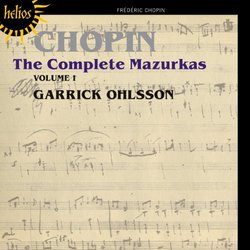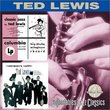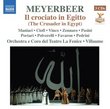| All Artists: Garrick Ohlsson Title: Chopin: Complete Mazurkas, Vol. 1 Members Wishing: 1 Total Copies: 0 Label: Hyperion Original Release Date: 1/1/2010 Re-Release Date: 1/12/2010 Album Type: Import Genres: New Age, Classical Styles: Instrumental, Historical Periods, Classical (c.1770-1830) Number of Discs: 1 SwapaCD Credits: 1 UPC: 034571153919 |
Search - Garrick Ohlsson :: Chopin: Complete Mazurkas, Vol. 1
 | Garrick Ohlsson Chopin: Complete Mazurkas, Vol. 1 Genres: New Age, Classical To celebrate the 200th anniversary of Chopin's birth, Hyperion has excerpted some of the finest performances from Garrick Ohlsson's complete Chopin project, originally recorded for the Arabesque label and reissued on Hyper... more » |
Larger Image |
CD DetailsSynopsis
Product Description To celebrate the 200th anniversary of Chopin's birth, Hyperion has excerpted some of the finest performances from Garrick Ohlsson's complete Chopin project, originally recorded for the Arabesque label and reissued on Hyperion as a 16-CD boxed set. These discs include some of th finest contemporary Chopin playing and include definitive performances of the complete etudes and mazurkas. Similar CDs
|
CD Reviews(+) Ohlsson Elevates the Mazurkas to an Apex of the Piano Re C. Pontus T. | SE/Asia | 03/19/2010 (5 out of 5 stars) "It would be more than an exaggeration to say that my relationship with Chopin's Mazurkas has always been a love affair. Quite the contrary, I do not think I even managed to get through all of them in my youth as played by Idil Biret on Naxos. Even if things improved markedly with Ashkenazy a few years later, they still remained my least favourite Chopin pieces for many years. However, it would not be an exaggeration at all to say that Ohlsson's 1998 twofer on Arabesque, to which I came rather late, opened the door to a completely different world altogether.
I know there are nearly as many 'Mazurka' doubters as Chopin lovers out there. They cannot be faulted, though, and nor can the pianists. Chopin's 57 or so Mazurkas are not like caviar or red wine (both of which I, by the way, seem unable to acquire a taste for regardless of exposure) but more like the Rubik's Cube: unless provided with a key (algorithm), one can try until time ends but still not get anywhere. I am sure there are more than one key to Chopin's Mazurkas--other pianists have indeed offered highly successful compilations of a handful of them, above all Moravec, Anderszewski, Kissin and likely some other pianists I am unaware of; but as of yet, I do not believe that Ohlsson has any rival in being able to offer an algorithm, which brings out so much beauty and originality that one grows eager to sit through the complete set all at once, repeatedly. Ohlsson's secret recipe, in my view, is his ability to distinguish the individual pieces from one another--indeed, they tend to sound a bit like 57 variations on a Mazurka theme in the hands of Biret, Rubinstein and even Ashkenazy--which he does by employing a perfectly balanced set of bold rubato, pungent accents, gorgeous bel-canto tone, refined phrasing and a sixth sense for the peculiar Mazurka 3/4 rhythm. This is still not to say that all the 57 Mazurkas are masterpieces; some are indeed fairly trivial musically--such as Op 6/3-4, Op 7/4-5, Op 24/3, on this disc. Nonetheless, the great ones do constitute some of the most darkly nostalgic, harmonically and melodically rich pieces not only in the Chopin oeuvre but in the entire piano repertoire! It goes without saying this statement is likely to encounter fierce criticism from several quarters; hence, some evidence will be needed: Most of the great Mazurkas happen to be noted in the keys of A minor and C-sharp minor, even if my two personal favourites are in B minor and B major, respectively (Op 33/4, Op 56/1); Frank Cooper's original liner notes state that Chopin taught the former as a ballade, 'stressing its narrative quality'. Already in Op 7/2 and Op 17/4, we find two A-minor pieces whose remarkably progressive chromaticism precedes Tristan und Isolde by nearly three decades (the latter has been put forward by some scholars as Chopin's greatest miniature together with the Op 27/1 Nocturne). With Op 30/4 and Op 41/4 in C-sharp minor, the rudimentary Polish dance form is transformed into full-scale concert pieces. Then there are four little gems just over two minutes in E minor (Op 17/2), C minor (Op 30/1), G-sharp minor (Op 33/1) and E minor (Op 41/1)--each abounding in wistful beauty. As much as I am addicted to the sound of Ohlsson's Bösendorfer Grand, used in the lion's share of his complete survey, the rebuilt Mason & Hamlin piano does produce marvellously colourful sonorities--if here caught somewhat too closely by Adam Abeshouse. Should I ever end up on that infamous desert island, and had the opportunity to bring my complete top-10 shortlist of great recordings, the original Arabesque twofer would doubtlessly by included. Since it has been unavailable for several years now, this Helios reissue of the first disc serves as the perfect second-best--being slightly preferable to the second disc as it contains the very zenith of the Mazurkas genre in the shape of Opp 30, 33 and 41. At Helios budget price (less than £5 on UK sites), no genuine lover of Chopin's music should afford to miss this disc. Next out is the second volume of the complete Mazurkas (Helios CDH55392). REFERENCE: This One (by a wide margin!)" |





